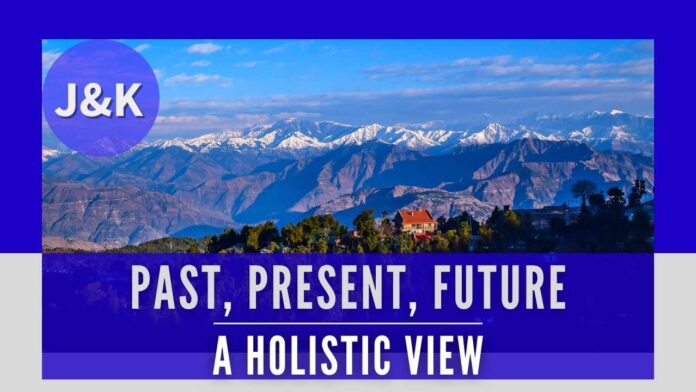
Kashmir issue – Understand the multiple dimensions
Philosophers have waxed eloquently on the diametrically opposite attributes of Kashmir – its panoramic beauty and decades of a bloodbath for years, but very less is written about it being the prominent seat of knowledge and consciousness in its glorious past.
This place that derives its name from the great Rishi Kashyap, is not just a piece of land with geo-political significance for India, but it is integral to us from a spiritual and cultural aspect.
With three years to the revocation of the special status of this state, as citizens of this country, it is pertinent for us to revisit the past, examine the present, and envision the future of J&K.
To this end, the Jammu Kashmir Study Center – Tamil Nadu Chapter organized a session with Shri Skandan Krishnan Ji on the 13th of Aug, 2022.
Skandan Krishnan Ji is a retired 1982 batch IAS officer of Tamil Nadu cadre. He served as the fourth Adviser to the J&K Governor Satya Pal Malik in 2019.
He has held senior positions in Tamil Nadu and served in the state for 25 years before joining the Central government services.
In the Central government, he was the Joint Secretary in charge of the Centre-State division, Kashmir division, from 2007 to 2012 and was assigned the charge of the Additional Secretary, Centre-State division, from 2012.
Based on his close association as an advisor to the governor on the legal and administrative aspects of repealing Article 370 and his previous stints in the state, he shared several objective insights on J&K and answered and discussed several queries that the audience had.
We benefited from the presence of a few Kashmiri Pandits in the audience whose deep understanding of the state, personal experiences, and anecdotes on the topic elevated the discussion to the next level.
The key insights from the discussion:
J&K of the past – Contributors to the disturbance in the valley
The discussion started with a high-level view of the reasons that contributed to the insurgency in the valley. One of the leading reasons for the international community’s interest and meddling in our state’s affairs is the geopolitical angle. Kashmir borders Afghanistan which provides access to South and Central Asia, which further opens up entry to Europe and other parts of Asia. The untethered entry to the Arabian Sea and subsequently the Persian Gulf and other waters makes it extremely important as a trade route.
The other very prominent aspect that the disturbance in Kashmir can be attributed to is the impact of the orthodox Salafi and Wahhabi schools of Islamic thought on the traditionally Sufi-influenced Kashmiris. With the intent to systematically militarize and radicalize the youth in Kashmir, Pakistan and Saudi Arabia funded Deobandis to move to the Valley and open madrassas. This strategy was formulated by Z A Bhutto after the West Pakistan Partition and was further propelled during the Zia-ul Haq regime. The students who got indoctrinated at these madrassas were mobilized as young foot soldiers for the late 80s and early 90s violence and the subsequent disturbances in Kashmir. The rise in militancy across the globe around the same period just added more fuel to the fire.
This wave of radicalization ensured a large Hindu exodus from the valley and also decimated all moderate mullahs.
Rampant internal corruption was one of the other reasons. Everyone who could exert any influence in the situation – politicians, moderators, separatists, and militants, was motivated by money. They were least bothered about the welfare of the masses.
The government response all the while this conflict was brewing and even when it blew up in our faces was delayed and hypocritical. They were well aware of the radicalization activities carried out by the Deobandis but chose to turn a blind eye to the situation.
At one point, during the cold war period, India’s stance on the issue was so poor that Pakistan had 15 resolutions against India in the UN. At that time, Russia saved us from the sanctions and blocked the internationalization of the issue.
The government started to initiate its response to address the problem only in ‘87.
Need for Article 370 abrogation and the present state
While the rationale for the revocation of Article 370 has been hotly contested by some, the aim behind this move was to fully integrate Kashmir and facilitate better administration, and end militancy.
Skanda Krishnan Ji from his vantage point put forth the administrative need for the abrogation of the Article and the need for the new domicile law.
The opaqueness in the ways of working of the state was a cause for concern. The lack of information or the unwillingness to share important information under the safety net of the special status was making it difficult for the central administrators. The state has also been infamous for widespread corruption that had been hindering its growth potential.
Also, the new domicile law that came along with the 370 repeal, fills in the lacunae that its predecessor – Article 35A was criticized for i.e. discrimination against the immigrant workers, refugees, and the state’s own womenfolk if they chose to marry out of state with the way it defined ‘Permanent Residents’.
The early indicators of the success of this abrogation have started to show. It is heartening to note that for the first time 60K government job posts were filled without corruption and wherever any instances of malpractices were observed due inquiry was conducted.
The state made more progress in one year of this revocation than what it did in the last five years put together (pre-370 repeal).
Way forward
On the topic of the future of people in this state, Skanda Krishnan Ji highlighted three basic expectations of the Kashmiris:
- They want jobs.
- They want an honest government.
- They need help in the resolution of land disputes.
The government should aim at providing for these and in general gaining the trust of the people.
While this is what is expected of the government, he feels certain aspects of normalization are in the hands of every citizen. The government can pave a way but to walk on it and the courage to still be on it while facing initial repercussions is something that all of us have to be responsible for – whether it is Kashmiri Pandits’ reintegration or industry investments and private jobs creation in the state. Citizens and industrialists will have to show the will to make the move and stay strong in the face of adversities. Normalcy will slowly resume in the valley, as we resist the wrong.
This was an extremely enriching discussion helping us see many aspects of the issue objectively from an administrator’s standpoint. The discussion was followed by an equally informative quiz by D Balaji Ji that led to subsequent discussions on the rich heritage of the state and the contribution of the many greats like Brig. Rajinder Singh and Maqbool Sherwani et al.
Note:
1. Text in Blue points to additional data on the topic.
2. The views expressed here are those of the author and do not necessarily represent or reflect the views of PGurus.
PGurus is now on Telegram. Click here to join our channel and stay updated with all the latest news and views
For all the latest updates, download PGurus App.
- Past, present and future of Jammu and Kashmir – A holistic view - August 25, 2022











Excellent and timely article.
No doubt, the path ahead is not easy. The adversaries are ruthless and bleed some more Pandits and migrants in Kashmir in the short term. But the Government can only facilitate a transition from the current to new Kashmir. Pandits and migrants in Kashmir should show some courage in the long term interest of the nation and Kashmir; otherwise, all the effort of the Government will be wasted.
It’s easy to pontificate like me from outside, but staying put bearing the brunt of the murderous attacks is not easy. But there is no other choice.
On its part, the Government should also strengthen the security for the Pandits and migrants in Kashmir as much as possible, and try to hasten the process of change.
I had myself advocated through my article in PGurus that the Government should transfer Government employees to Jammu, but I had added “unless the Government has better plans”. Voting rights for non-locals working in Kashmir, similar to the rest of the country, is one such good plan.
Kashmiri Pandits and migrants in Kashmir should decide how they want to move forward in respect of Kashmir, whether to succumb to bullyism or stand up and fight the bullies along with the Government.